Divorce Papers in Pakistan: Types of Divorce Papers and Legal Significance
Divorce Papers in Pakistan | Types of Divorce Papers
Talaq Nama (Divorce Deed), and Decree of Khula

Divorce papers in Pakistan are official documents used to validate the separation between a husband and wife. These papers act as a legal record of the termination of the marital relationship and ensure that both parties comply with the laws governing divorce. The documents vary based on the type of divorce, whether it is initiated by the husband (Talaq) or the wife (Khula).
Types of Divorce in Pakistan and Associated Papers
Talaq (Repudiation by the Husband)
Talaq Nama (Written Declaration of Divorce)
Notice of Talaq to the Union Council
Acknowledgment Receipt of the Notice by the Wife
Talaq is a process where the husband initiates the divorce by formally declaring his intention to dissolve the marriage. The associated divorce papers for Talaq include:
Khula (Initiated by the Wife)
Application for dissolution of marriage by way of Khula to the Family Court
Court Summons to the Husband
Court Decree Granting Khula
Khula is the process through which a wife seeks divorce by filing a case in a family court. The divorce papers for Khula typically include:
Mubarat (Mutual Divorce)
Written Agreement of Mutual Divorce
Notice to the Union Council
Certificate of Registration of Divorce
Mubarat refers to a mutual agreement between the husband and wife to dissolve the marriage. The required documents include:
Significance of Divorce Papers Under Islamic Principles
In Islam, marriage and divorce are considered solemn contracts with specific rights and obligations for both parties. Divorce papers serve the following purposes under Islamic law:
Formalization of Talaq or Khula: The written documentation ensures that the process aligns with Shariah principles.
Protection of Women’s Rights: By documenting divorce, the wife’s rights, such as dower (Mahr), maintenance, and custody of children, are safeguarded.
Clarity and Avoidance of Disputes: Divorce papers provide a clear record, minimizing potential conflicts regarding the terms of separation.
Legal Value of Divorce Papers in Pakistan
Divorce papers carry immense legal value in Pakistan as they are required to:
Establish Legal Proof of Divorce
The Talaq Nama and court decrees are indispensable for proving that a marriage has been legally dissolved.
Facilitate Registration with the Union Council
In Pakistan, it is mandatory to register the divorce with the Union Council or relevant local government authority. Divorce papers form the basis for this registration.
Resolve Post-Divorce Legal Matters
Issues such as alimony, child custody, and inheritance depend on the formalization of the divorce through official papers.
Procedure for Obtaining Divorce Papers
For Talaq
Declaration of Talaq: The husband must issue a written declaration of Talaq, which is then signed in the presence of witnesses.
Submission to the Union Council: The Talaq Nama is sent to the Union Council within 30 days.
Notice to the Wife: The Union Council sends a notice to the wife and arranges reconciliation meetings. If reconciliation fails, the divorce is finalized.
For Khula
Filing a Petition: The wife files a Khula application in the family court.
Court Proceedings: The court hears the case and attempts reconciliation.
Court Decree: If reconciliation fails, the court issues a decree, finalizing the divorce.
Union Council Registration: The decree is registered with the Union Council to obtain an official certificate.
Role of Law Firms in Divorce Cases
Navigating the legal intricacies of divorce in Pakistan can be challenging. Law firms specializing in family law play a vital role by:
Providing Legal Advice: Divorce Lawyers guide clients on their rights and obligations under Islamic and Pakistani law.
Drafting Divorce Papers: Legal experts ensure that all documents are correctly prepared and submitted.
Representing Clients in Court: For Khula or contested divorces, legal representation is crucial to protect the client’s interests.
Handling Registration: Law firms facilitate the registration of divorce with the Union Council.
Common Challenges in the Divorce Process
Despite clear procedures, individuals often face hurdles during the divorce process, such as:
Delays in Legal Proceedings: Family court cases can be prolonged due to workload or procedural inefficiencies.
Resistance to Registration: Some individuals may avoid registering divorce, causing legal complications later.
Cultural Stigma: Divorce remains a taboo in many parts of Pakistan, leading to emotional and social challenges for both parties.
Divorce Papers are a Cornerstone of the Legal Framework
Divorce papers are a cornerstone of the legal and religious framework governing the dissolution of marriage in Pakistan. They ensure that the process is conducted transparently and in compliance with both Islamic principles and Pakistani law. By understanding the types, significance, and legal value of divorce papers, individuals can navigate this complex process more effectively. With the assistance of experienced law firms, the challenges associated with divorce can be mitigated, ensuring that the rights of both parties are protected.
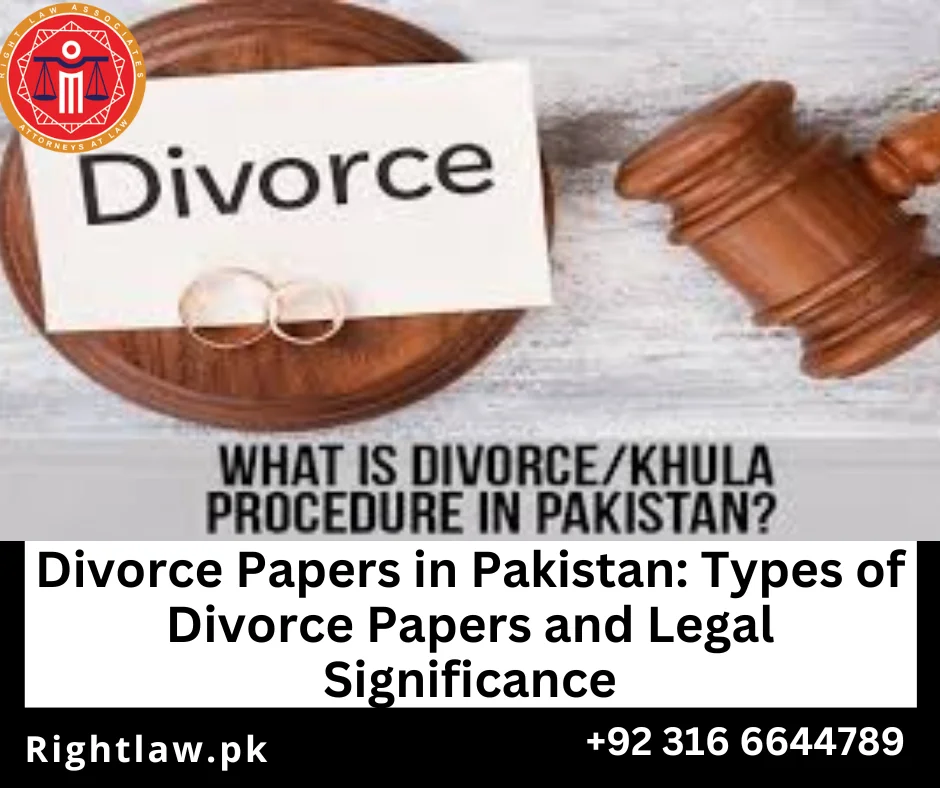
Divorce papers in Pakistan are official documents used to validate the separation between a husband and wife. These papers act as a legal record of the termination of the marital relationship and ensure that both parties comply with the laws governing divorce. The documents vary based on the type of divorce, whether it is initiated by the husband (Talaq) or the wife (Khula).
Types of Divorce in Pakistan and Associated Papers
Talaq (Repudiation by the Husband)
Talaq Nama (Written Declaration of Divorce)
Notice of Talaq to the Union Council
Acknowledgment Receipt of the Notice by the Wife
Talaq is a process where the husband initiates the divorce by formally declaring his intention to dissolve the marriage. The associated divorce papers for Talaq include:
Khula (Initiated by the Wife)
Application for dissolution of marriage by way of Khula to the Family Court
Court Summons to the Husband
Court Decree Granting Khula
Khula is the process through which a wife seeks divorce by filing a case in a family court. The divorce papers for Khula typically include:
Mubarat (Mutual Divorce)
Written Agreement of Mutual Divorce
Notice to the Union Council
Certificate of Registration of Divorce
Mubarat refers to a mutual agreement between the husband and wife to dissolve the marriage. The required documents include:
Significance of Divorce Papers Under Islamic Principles
In Islam, marriage and divorce are considered solemn contracts with specific rights and obligations for both parties. Divorce papers serve the following purposes under Islamic law:
Formalization of Talaq or Khula: The written documentation ensures that the process aligns with Shariah principles.
Protection of Women’s Rights: By documenting divorce, the wife’s rights, such as dower (Mahr), maintenance, and custody of children, are safeguarded.
Clarity and Avoidance of Disputes: Divorce papers provide a clear record, minimizing potential conflicts regarding the terms of separation.
Legal Value of Divorce Papers in Pakistan
Divorce papers carry immense legal value in Pakistan as they are required to:
Establish Legal Proof of Divorce
The Talaq Nama and court decrees are indispensable for proving that a marriage has been legally dissolved.
Facilitate Registration with the Union Council
In Pakistan, it is mandatory to register the divorce with the Union Council or relevant local government authority. Divorce papers form the basis for this registration.
Resolve Post-Divorce Legal Matters
Issues such as alimony, child custody, and inheritance depend on the formalization of the divorce through official papers.
Procedure for Obtaining Divorce Papers
For Talaq
Declaration of Talaq: The husband must issue a written declaration of Talaq, which is then signed in the presence of witnesses.
Submission to the Union Council: The Talaq Nama is sent to the Union Council within 30 days.
Notice to the Wife: The Union Council sends a notice to the wife and arranges reconciliation meetings. If reconciliation fails, the divorce is finalized.
For Khula
Filing a Petition: The wife files a Khula application in the family court.
Court Proceedings: The court hears the case and attempts reconciliation.
Court Decree: If reconciliation fails, the court issues a decree, finalizing the divorce.
Union Council Registration: The decree is registered with the Union Council to obtain an official certificate.
Role of Law Firms in Divorce Cases
Navigating the legal intricacies of divorce in Pakistan can be challenging. Law firms specializing in family law play a vital role by:
Providing Legal Advice: Divorce Lawyers guide clients on their rights and obligations under Islamic and Pakistani law.
Drafting Divorce Papers: Legal experts ensure that all documents are correctly prepared and submitted.
Representing Clients in Court: For Khula or contested divorces, legal representation is crucial to protect the client’s interests.
Handling Registration: Law firms facilitate the registration of divorce with the Union Council.
Common Challenges in the Divorce Process
Despite clear procedures, individuals often face hurdles during the divorce process, such as:
Delays in Legal Proceedings: Family court cases can be prolonged due to workload or procedural inefficiencies.
Resistance to Registration: Some individuals may avoid registering divorce, causing legal complications later.
Cultural Stigma: Divorce remains a taboo in many parts of Pakistan, leading to emotional and social challenges for both parties.
Divorce Papers are a Cornerstone of the Legal Framework
Divorce papers are a cornerstone of the legal and religious framework governing the dissolution of marriage in Pakistan. They ensure that the process is conducted transparently and in compliance with both Islamic principles and Pakistani law. By understanding the types, significance, and legal value of divorce papers, individuals can navigate this complex process more effectively. With the assistance of experienced law firms, the challenges associated with divorce can be mitigated, ensuring that the rights of both parties are protected.

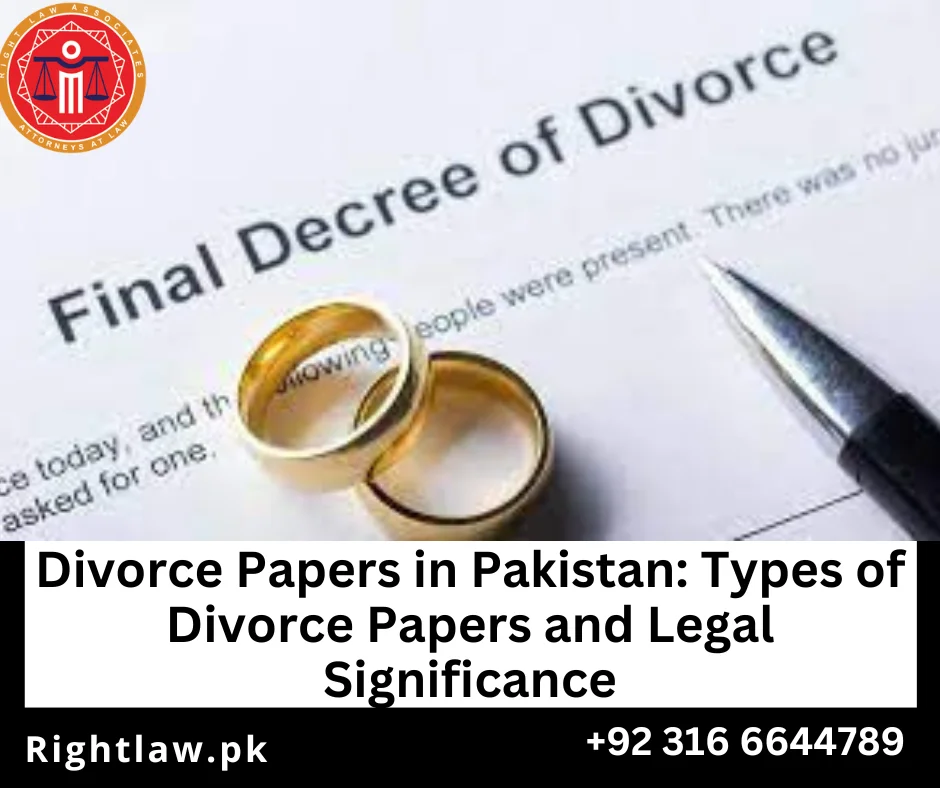
Understanding Divorce Papers in Pakistan: A Legal and Islamic Perspective
Divorce is a sensitive subject, yet an essential aspect of personal law in Pakistan. In Islam, marriage is a sacred bond, but when the union becomes untenable, the religion and the law provide mechanisms to dissolve it with dignity and fairness. Divorce papers are crucial in formalizing this process, ensuring both parties’ rights are legally protected. This article explores various facets of divorce papers in Pakistan, including their types, significance under Islamic principles, and their legal value.
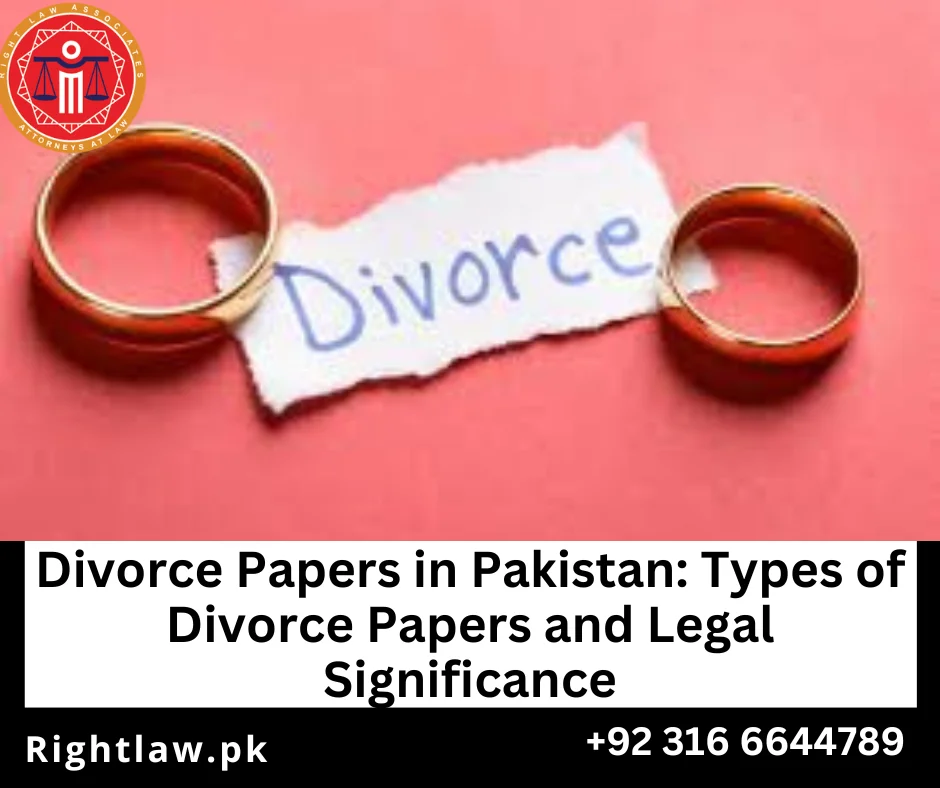
The trend of online marriage and online nikah has grown in Karachi, Islamabad & Lahore, Pakistan.
Khula in Islam: A Woman’s Right to Divorce
Khula in Islam: Historical Context, Procedure, and Legal Implications in Pakistan
Marriage in Islam is a sacred bond, founded on mutual respect, love, and understanding. However, when a marital relationship becomes untenable, Islamic principles provide solutions for both men and women to seek separation in a just and dignified manner. While Talaq empowers a man to initiate divorce, Khula stands as a significant right for women, granting them the ability to dissolve their marriage under specific conditions. This article delves into the concept of Khula in Islam, its historical context, procedural aspects, and legal implications in Pakistan.
Understanding Khula in Islam
Khula, derived from the Arabic root word “khal’a,” meaning “to remove” or “to take off,” refers to a process where a wife seeks to end her marriage by returning her dower (mahr) or another agreed-upon compensation to her husband. It is explicitly mentioned in the Quran and Hadith, making it an integral part of Islamic jurisprudence.
The Quranic reference to Khula is found in Surah Al-Baqarah (2:229):
“It is not lawful for you (men) to take back anything you have given them (women) unless both fear that they cannot maintain the limits of Allah. But if you fear that they cannot maintain the limits of Allah, then there is no sin upon either of them concerning that by which she ransoms herself.”
Historical Context of Khula
The practice of Khula dates back to the time of Prophet Muhammad (peace be upon him). One of the most cited examples is the case of Jamila bint Ubayd, who sought divorce from her husband because she found him unbearable despite his good character. The Prophet allowed her to return the garden her husband had given as mahr and granted her separation, emphasizing the principle of fairness and mutual consent.
The Process of Khula in Islamic Jurisprudence
The procedural aspects of Khula may vary slightly across Islamic schools of thought, but the foundational principles remain the same:
- Initiation by the Wife: The wife initiates the process by expressing her desire for separation.
- Compensation: The wife typically agrees to return the dower (mahr) or provide another form of compensation to the husband.
- Consent or Judicial Intervention: While Khula is ideally based on mutual consent, a wife can seek judicial intervention if the husband refuses to agree.
- Approval and Finalization: Once the husband consents or the court grants Khula, the marriage is dissolved, and the parties are free to remarry.
Khula in Pakistan: Legal Provisions
In Pakistan, the legal framework for Khula is governed by the Family Courts Act, 1964. A wife seeking Khula can file a suit in a family court, citing valid reasons for wanting a separation. Common grounds include:
- Incompatibility or irreconcilable differences.
- Abuse, neglect, or maltreatment by the husband.
- Lack of financial support.
- Desertion or absence of the husband.
The court evaluates the case and may order the wife to return the dower or compensation to the husband. If reconciliation efforts fail, the court issues a decree for Khula, effectively dissolving the marriage.
Significance of Khula in Islam
Khula is a testament to the balance and justice inherent in Islamic marital laws. It recognizes the wife’s right to seek freedom from a marriage that has become a source of hardship or dissatisfaction. This mechanism ensures that women are not trapped in oppressive relationships, granting them autonomy and dignity within the framework of Islamic principles.
Challenges and Misconceptions
Despite its legal and religious validity, Khula often faces societal resistance in conservative cultures. Many view it as a taboo or associate it with stigma, discouraging women from exercising their right. Additionally, there are misconceptions that Khula undermines the sanctity of marriage, whereas, in reality, it aims to preserve justice and harmony in society.
Protecting Women’s Rights Through Khula
Khula empowers women to take control of their lives while maintaining the moral and ethical standards of Islam. It is a reminder that Islam values equity in relationships and provides solutions to ensure the well-being of its followers. Scholars and advocates in Pakistan are increasingly emphasizing the importance of creating awareness about Khula to address social barriers and protect women’s rights.
Khula Offers Women a Dignified Way to Dissolve a Troubled Union
Khula is a profound example of how Islamic law balances the rights and responsibilities of both genders in marriage. It offers women a dignified way to dissolve a troubled union, ensuring fairness and justice for all parties involved. In Pakistan, while the legal system facilitates this right, societal attitudes need to evolve to fully embrace and support women exercising their Islamic right to Khula.
Trusted Family Lawyers for Comprehensive Legal Support in Divorce and Khula Cases
Why Choose Our Family Lawyers?
- Experienced Team: Our family lawyers are well-versed in family law and Islamic principles, ensuring every case is handled professionally.
- Personalized Solutions: We understand that every family law case is unique and provide tailored legal services to meet individual needs.
- Transparency: Clients are kept informed about the progress of their case, with clear communication at every stage.
- Efficient Service: We prioritize resolving cases efficiently, minimizing stress and delays for our clients.
- Our team ensures that clients receive their NADRA Divorce Certificates promptly, enabling them to proceed with their lives post-divorce without legal ambiguities.
Contact Us for Professional Family Law Services
Whether you need assistance with drafting a Divorce Deed, filing for Khula, or obtaining a NADRA Divorce Certificate, our family lawyers are here to help. With offices in Karachi, Lahore, Islamabad, Rawalpindi, and other major cities, we are committed to delivering reliable legal services with compassion and expertise. Let us guide you through the complexities of family law and help you achieve a resolution that protects your rights and interests.
Legal Services
Our Attorneys

Let's Connect
- +92 333 2316871
- [email protected]
-
Karachi Head Office:
A-1937/B, Near Shop 399 Garment Store, Metroville III Colony, Scheme 33, Gulzar e Hijri, Maulana Yousuf Ludhianwi Road, Karachi, Pakistan -
Karachi Branch:
M-51, Muneer Mobile Mall, Block 17, Near Perfume Chowk & Jauhar Chowrangi, Gulistan-e-Jauhar, Karachi, Pakistan -
Islamabad Office:
Suite No. 5, 2nd Floor, Laraib Centre, Mangla Road, Karachi Company, G-9 Markaz, Islamabad, Pakistan -
Lahore Office:
Office No. 2, 1st Floor, Landmark Plaza, Jail Road, Lahore, Pakistan
-
Court Marriage with Full Privacy Assurance
-
Court Marriage for Couples Seeking Legal Union
-
Court Marriage in Pakistan: Court Marriage Process & Fees
-
Court Marriage: Confidential & Hassle-Free Solutions
-
Trend of Court Marriage in Pakistan: Court Marriage's Reasons
-
Court Marriage Services in Karachi, Lahore, Islamabad, and Rawalpindi
-
Understanding Court Marriage in Pakistan: A Guide to Court Marriage
-
Best Family: What Makes a Family Truly Great
-
Divorce Papers in Pakistan: Divorce Deed and NADRA Divorce Certificate
-
Court Marriage in Pakistan: Procedure and Fees
-
Court Marriage in Lahore: Our Court Marriage Service in Lahore
-
Nikah Khawan and Nikah Registrar Services in Karachi, Pakistan
-
Family Law in Pakistan-The Muslim Family Law Ordinance 1961
-
Understanding Online Nikah: The Crucial Roles of Nikah Khawan and Nikah Registrar
-
Nikah Khawan and Nikah Registrar Services in Pakistan
-
Lawyers Help for Court Marriage Procedure in Karachi
-
Online Marriage in Islam: Muslim Online Marriage
-
Court Marriage in Pakistan—Legal Procedure, Social Realities, and Support for Couples
-
Court Marriage, Online Marriage, and Nikah-Khawan Services in Islamabad & Rawalpindi
-
Online Marriage/Nikah | Online Marriage/Nikah Services In and From Pakistan
-
Nikah Khawan/Qazi Services and Fees in Karachi-Lahore-Islamabad/Rawalpindi-Faisalabad-Multan
-
Court Marriage Pakistan | Court Marriage Services-Process-Fees in Pakistan
-
Embracing Online Marriage Services Across Karachi, Lahore, Islamabad, and Rawalpindi, Pakistan
-
Family Law | Expert Divorce Lawyers For Khula/Talaq (Divorce) in Karachi, Islamabad/Rawalpindi & Lahore, Pakistan
-
Guardianship Lawyers in Karachi, Lahore, & Islamabad Pakistan
-
Child Custody Lawyers in Karachi, Lahore, & Islamabad-Pakistan
-
English Nikah Nama | English Nikah Nama Available in Karachi
-
Family Law | Expert Divorce Lawyers For Khula/Talaq (Divorce) in Karachi, Islamabad/Rawalpindi & Lahore, Pakistan
Shari'a Worth of Divorce Papers (Divorce Deed)
Under Shari’a law, divorce papers serve as evidence of a legitimate marital dissolution. Islam emphasizes the importance of clarity and accountability in all transactions, including the termination of marriage. The Talaq Nama aligns with these principles by providing a written record of the divorce, ensuring that the process is conducted following Islamic injunctions.
Talaq Nama (Divorce Deed): Formal Documentation of Divorce
The Talaq Nama, or divorce deed, is a written document that formalizes the declaration of divorce by the husband. This document includes critical details such as:
- Names of the husband and wife
- Date and place of marriage
- Reasons for divorce (if any)
- Pronouncement of Talaq
- Signatures of the husband, witnesses, and relevant legal authorities
In Pakistan, the Talaq Nama must be registered with the local Union Council to ensure legal validity. This registration is essential to avoid disputes and to safeguard the rights of both parties, particularly in matters related to maintenance, custody of children, and inheritance.
Types of Divorce Papers in Pakistan
Khula is an Islamic provision allowing a wife to seek divorce from her husband by returning her dower (Mahr) or an agreed-upon compensation. The Quran states:
“But if you fear that they will not keep within the limits of Allah, then there is no sin upon either of them concerning that by which she ransoms herself.” (Quran 2:229)
In Pakistan, Khula is granted through family courts when a wife proves that the marriage has become unmanageable due to valid reasons such as cruelty, neglect, or irreconcilable differences. The court decree formalizing Khula acts as the wife’s divorce paper, ensuring her legal and Shari’a rights.
Legal Framework and Importance of Divorce Papers in Pakistan
In Pakistan, divorce papers carry significant legal weight. The Muslim Family Laws Ordinance, of 1961, governs the process of divorce. According to this law:
- The husband must notify the local Union Council in writing after pronouncing Talaq.
- The Union Council initiates a 90-day reconciliation process.
- If reconciliation fails, a divorce certificate is issued, finalizing the separation.
Divorce papers not only formalize the end of the marriage but also protect the legal rights of both parties. They are crucial in resolving issues such as maintenance, custody of children, and remarriage.
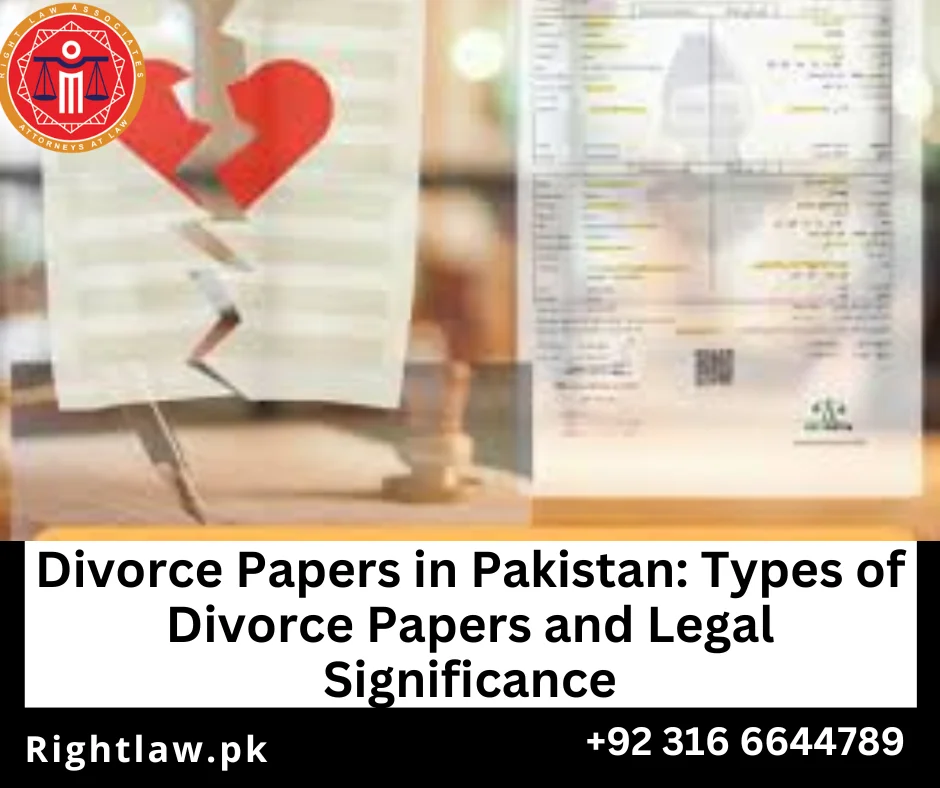
Divorce Papers for Judicial Separation
In cases where marital disputes escalate, a judicial separation may be sought through the family court. The court’s decision is documented in the form of a decree, which is legally binding and serves as an official record of the separation.
Talaq in Islam: Dissolution of Marriage by the Husband
In Islam, the process of divorce, or Talaq, is a mechanism for a husband to dissolve a marriage. Talaq can be issued in several forms, such as Talaq-e-Ahsan (the most preferred method involving a single pronouncement followed by a waiting period), Talaq-e-Hasan (multiple pronouncements over three menstrual cycles), and Talaq-e-Biddat (instantaneous triple Talaq, which is not favored in many Islamic schools of thought).
The Quran emphasizes reconciliation before divorce, and the role of mediators from both families is highlighted to resolve conflicts. However, when all efforts fail, Talaq offers a means to end the marital relationship while maintaining the dignity of both parties.
Importance of Divorce Papers for Women’s Rights
Divorce papers play a pivotal role in safeguarding women’s rights in Pakistan. They provide:
- Legal Protection: Ensuring women can claim maintenance, child support, or any other entitlements.
- Recognition: Offering proof of marital dissolution to prevent allegations of adultery or illicit relationships.
- Freedom: Allowing women to remarry without social or legal hindrances.
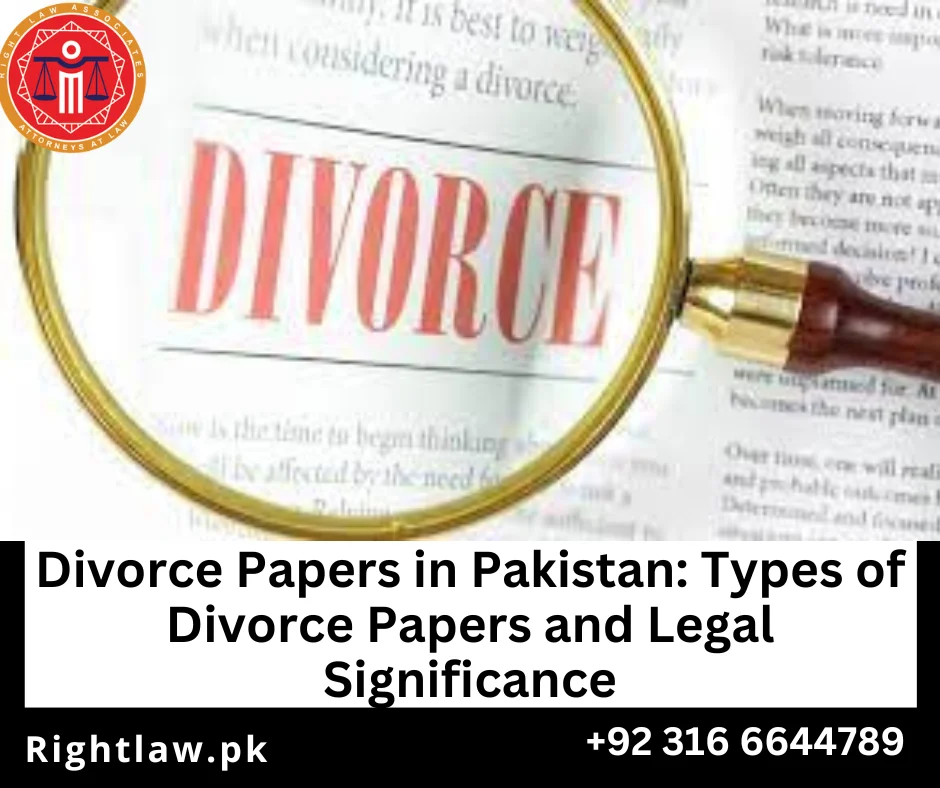
Conditional Divorce and its Application
Islamic law permits conditional divorce, which becomes effective when a predefined condition is met. For instance, a husband may issue Talaq contingent upon a future event. Such divorce papers specify the conditions clearly, ensuring legal and religious validity.
Several types of divorce papers are recognized in Pakistan, each serving a distinct purpose:
1. Divorce Deed (Talaq Nama)
This is the formal document issued by the husband to declare divorce. It is the most common type of divorce paper in Pakistan and is essential for legal and Shari’a compliance.
2. Divorce with Mutual Consent
A mutual consent divorce deed is prepared when both spouses agree to end the marriage. This document outlines the terms of separation, including financial settlements, custody arrangements, and any other agreed-upon conditions.
3. Conditional Divorce Deed
In some cases, a husband may issue a conditional divorce, where the Talaq becomes effective upon fulfillment of specific conditions, such as the wife’s relocation or other predetermined events.
4. Court Order/Decree of Khula
If a woman seeks divorce through Khula, she must file a case in the family court. Upon review, the court may issue a decree of Khula, which serves as the legal equivalent of divorce papers for the wife.
Expert Family Lawyer Services for Divorce Deed Drafting and Legal Assistance in Khula Cases
At our law firm, we specialize in providing comprehensive legal services related to family law matters, including drafting Divorce Deeds, representing clients in Khula cases, and facilitating the acquisition of NADRA Divorce Certificates. With experienced divorce lawyers in Karachi, Lahore, Islamabad, Rawalpindi, and other cities in Pakistan, we ensure a seamless and legally sound process for our clients.
1. Drafting Precise and Legally Binding Divorce Deeds
The Divorce Deed is a critical legal document that formalizes the separation between a husband and wife. Our expert family and divorce lawyers:
- Draft customized Divorce Deeds tailored to the specific circumstances of the clients.
- Ensure compliance with the Muslim Family Laws Ordinance, 1961, and other relevant regulations in Pakistan.
- Provide guidance to both parties on the rights and obligations mentioned in the document to avoid future disputes.
By relying on our expertise, clients can rest assured that their Divorce Deed is professionally handled with accuracy and adherence to the law.
2. Legal Representation in Khula Cases
Khula is a significant legal right for women under Islamic law, allowing them to seek dissolution of marriage through a court. Our family and divorce lawyer‘s services include:
- Assisting in filing a Khula petition in the family court.
- Pleading the case with strong legal arguments and evidence to ensure the best outcome for our clients.
- Navigating the legal framework for the return of the dower (mahr) or other settlements, as required by the court.
- Offering compassionate support to women throughout the Khula process, ensuring their dignity and rights are upheld.
Our family lawyers have extensive experience in handling Khula cases efficiently while keeping the client’s best interests in mind.
3. Facilitating NADRA Divorce Certificate Acquisition
Obtaining a NADRA Divorce Certificate is a crucial step to formalize a divorce in Pakistan. Our services for NADRA Divorce Certificate issuance include:
- Submitting the necessary notifications to the Union Council or Arbitration Council as per legal requirements.
- Guiding clients through the reconciliation period mandated by law and ensuring proper documentation.
- Applying with NADRA and following up until the certificate is issued.
